[ad_1]
(houseofbhakti.com) – Who attains Prāpañcika Vaikuṇṭha? | House of Bhakti

An excerpt from a śloka class (Śrī Manaḥ-śikṣā, Verse 9) given by Śrīla Bhaktivedānta Nārāyaṇa Mahārāja in Cebu, Philippines, on January 16, 2009, published in Walking with a Saint – Morning Walks and Conversations 2009
Śrīla Bhaktivedānta Nārāyaṇa Mahārāja: What is the śloka?
[All the students present recite the śloka, one after another:]
madīśā-nāthatve vraja-vipina-candraṁ vraja-vane
śvarīṁ tāṁ-nāthatve tad-atula-sakhītve tu lalitām
viśākhāṁ śikṣālī-vitaraṇa-gurutve priya-saro
girīndrau tat-prekṣā-lalita-rati-datve smara manaḥ
[O mind, always remember Vṛndāvana-candra Śrī Kṛṣṇa as the prāṇanātha (Lord of the life-breath) of my 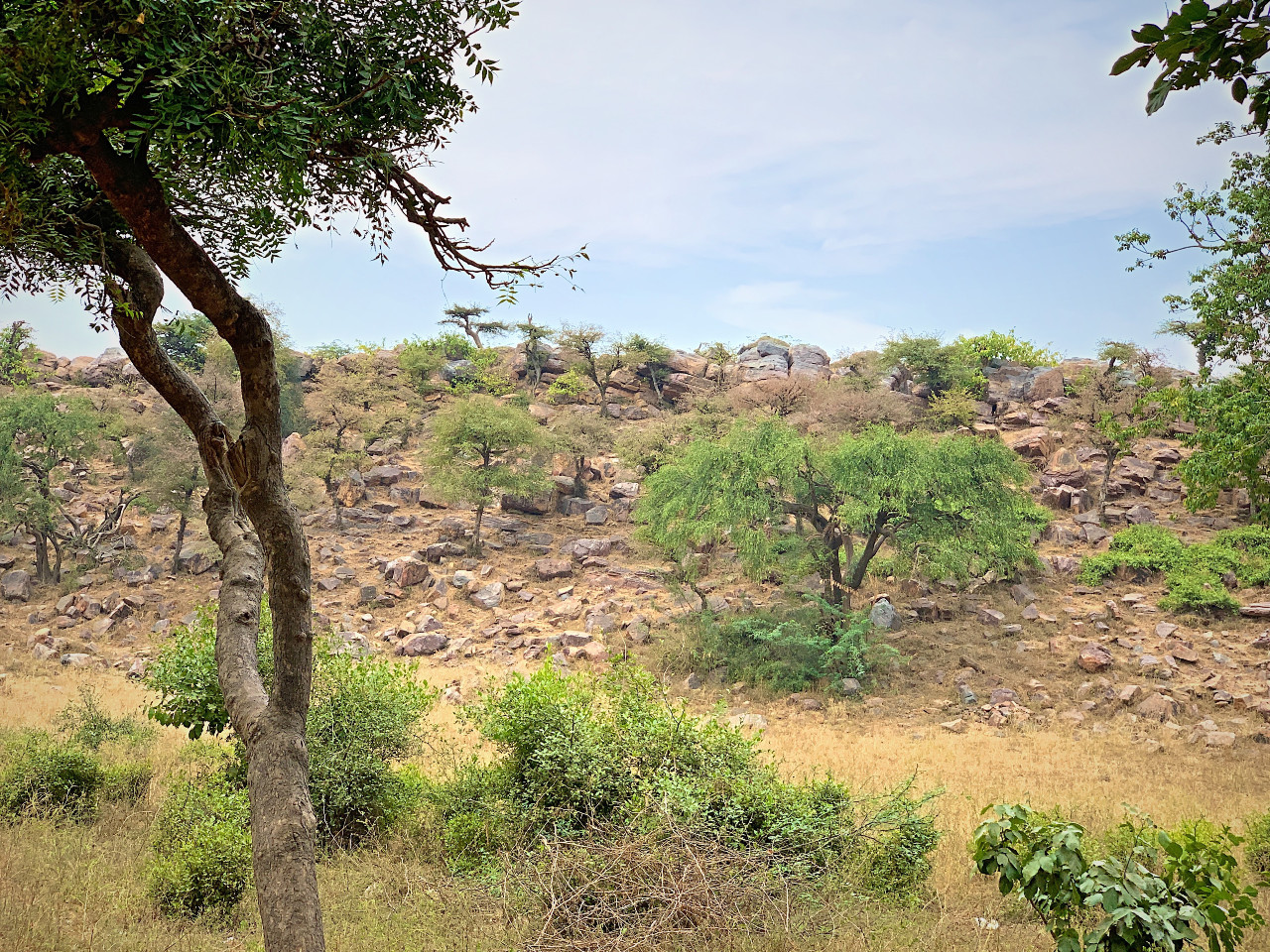 Svāminī Śrī Rādhikā, Vṛndāvaneśvarī Śrīmatī Rādhikā as my mistress, Śrī Lalitā as the peerless friend of my Svāminī, Śrī Viśākhā as the śikṣā-guru in the arrangements of Śrī Yugala sevā, and Śrī Rādhā-kuṇḍa and Girirāja Govardhana as those who grant darśana of Śrī Rādhā-Kṛṣṇa and bestow sublime rati for Their lotus feet.]
Svāminī Śrī Rādhikā, Vṛndāvaneśvarī Śrīmatī Rādhikā as my mistress, Śrī Lalitā as the peerless friend of my Svāminī, Śrī Viśākhā as the śikṣā-guru in the arrangements of Śrī Yugala sevā, and Śrī Rādhā-kuṇḍa and Girirāja Govardhana as those who grant darśana of Śrī Rādhā-Kṛṣṇa and bestow sublime rati for Their lotus feet.]
Śrīla Bhaktivedānta Nārāyaṇa Mahārāja: As the essence of all instruction is Verse Eight of Śrī Upadeśāmṛta, beginning [with] tan nāma-rūpa caritādi-sukīrtanānu, this śloka is the essence of the entire Manaḥ-śikṣā.
(To Vrajanātha dāsa) After this class I will go to have breakfast, and then rest. Then, at 8 o’clock, because I have completed all my work, you can give me more pages to work on. And please tell Kṛṣṇa-kṛpā to send another file at once.*
Vrajanātha dāsa: I told him yesterday.
Śrīla Bhaktivedānta Nārāyaṇa Mahārāja: When will he send it? He should send it at once.
Vrajanātha dāsa: I requested him to send it ‘at once.’
Śrīla Bhaktivedānta Nārāyaṇa Mahārāja: (To Tamopahā dāsa) What is the meaning?
Tamopahā dāsa: My dear mind, always remember that the Lord of Vṛndāvana, Śrī Kṛṣṇa, Vṛndāvana-candra, and His Īśvarī, Śrīmatī Rādhikā, are the Lords of Vṛndāvana, and Lalitā is Her…
Śrīla Bhaktivedānta Nārāyaṇa Mahārāja: Speak clearly. This is important.
[Tamopahā dāsa explains the verse.]
Śrīla Bhaktivedānta Nārāyaṇa Mahārāja: Your explanation is still not clear. (To Madhuvrata dāsa) Can you explain?
Madhuvrata dāsa: O my dear mind, always remember Vṛndāvanacandra Śrī Kṛṣṇa as the prāṇanātha, the dear-most beloved, of my Svāminī, Śrīmatī Rādhikā.
Śrīla Bhaktivedānta Nārāyaṇa Mahārāja: Oh, yes. This is the meaning.
Madhuvrata dāsa: Always remember Śrīmatī Rādhikā as my Mistress or Svāminī.
Śrīla Bhaktivedānta Nārāyaṇa Mahārāja: Svāminījī [jī denotes affection and respect].
Madhuvrata dāsa: Svāminījī. Always remember Śrīmatī Lalitā-devī as the dear-most sakhī of Śrīmatī Rādhikā. Always remember Viśākhā-devī as Their śikṣā-guru in matters of conjugal rasa. Always remember Girirāja Govardhana and Śrī Rādhā-kuṇḍa, as they will bestow upon us this sublime rati.
Śrīla Bhaktivedānta Nārāyaṇa Mahārāja: Very good.
(To Campakalatā dāsī) Have you understood something? Who is your mistress?
Campakalatā dāsī: Rādhikā.
Śrīla Bhaktivedānta Nārāyaṇa Mahārāja: Who is Lalitā?
Campakalatā dāsī: I don’t know.
Śrīla Bhaktivedānta Nārāyaṇa Mahārāja: Who is Viśākhā?
Campakalatā dāsī: Śikṣā-guru.
Śrīla Bhaktivedānta Nārāyaṇa Mahārāja: Who can bestow mercy so that we can become servants of Rādhikā?
Campakalatā dāsī: Govardhana.
Śrīla Bhaktivedānta Nārāyaṇa Mahārāja: Govardhana and Rādhā-kuṇḍa.
There was a king named Uttānapāda, who was the ruler of the entire universe. He had two wives: the first was  named Sunīti, meaning that she was full of all good qualities and especially she was a worshiper of Kṛṣṇa; and the second was named Suruci, meaning that she was absorbed in sense gratification and attached to worldly things like kingdom, wealth, and material knowledge. Sunīti had a son named Dhruva, meaning that he was fixed and determined; and Suruci had a son named Uttama.
named Sunīti, meaning that she was full of all good qualities and especially she was a worshiper of Kṛṣṇa; and the second was named Suruci, meaning that she was absorbed in sense gratification and attached to worldly things like kingdom, wealth, and material knowledge. Sunīti had a son named Dhruva, meaning that he was fixed and determined; and Suruci had a son named Uttama.
Once, King Uttānapāda was sitting on his throne, and Uttama, the younger son, was sitting on his lap. Dhruva was playing nearby with some boys and, seeing his brother on the lap of his father, he told his father, “I too want to sit on your lap.”
In the meantime, Suruci came and declared, “Dhruva, you cannot sit on your father’s lap. If you want to sit on his lap, you will have to perform austerities and then take your next birth from my womb.” The king wanted to take Dhruva on his lap; however, bewildered by Suruci’s beauty, he feared displeasing her.
Dhruva began to weep. Along with his friends he went to his mother, who asked him, “Why are you weeping?” Dhruva’s friends told her, “He wanted to sit on his father’s lap, but Suruci warned him, ‘You can sit on his lap only after you take birth from my womb.’ ”
Dhruva’s mother replied, “You are weeping about this? This is a very small thing. If you desire, you can control the entire universe. Go to the forest and engage in austerities to please the Supreme Lord, and He will give you the benediction to become king.” Thus, Dhruva left his father’s house during the night and went to the forest.
(To Vrajanātha dāsa) What more?
Vrajanātha dāsa: When he got to the forest, Dhruva began to search for God, and Nārada Ṛṣi appeared to him.
Śrīla Bhaktivedānta Nārāyaṇa Mahārāja: Kṛṣṇa inspired Nārada to go and help him.
Vrajanātha dāsa: Great saintly persons always look for ways to benefit those who have forgotten their relationship with God. Nārada Ṛṣi was thus inspired by Kṛṣṇa to go to Dhruva…
Śrīla Bhaktivedānta Nārāyaṇa Mahārāja: And help him.
Vrajanātha dāsa: And help him. Nārada met with Dhruva and said, “My boy, what are you doing here? You are so small. What are you looking for in the forest? Better to go home.”
Dhruva replied, “No, dear sir, I am searching for God.”
Nārada replied, “What do you want from God?”
Dhruva said, “I want a kingdom greater than that of my great-grandfather.”
Śrīla Bhaktivedānta Nārāyaṇa Mahārāja: Nārada said, “Better to return home, because the forest is full of lions and tigers who will eat you.” He was testing Dhruva.
Vrajanātha dāsa: He was testing to see if Dhruva was serious. “Better to go home. Come back when you are strong and have no fear of any dangerous situations.”
Dhruva replied, “No, I want that kingdom now. Please instruct me so that I will have darśana of the Lord so that He will give me His benediction.”
Nārada Ṛṣi agreed, “All right. I will give you a special mantra to chant by which God will manifest and bestow His special benediction upon you.” He gave Dhruva the mantra, after which Dhruva continually meditated on it.
Śrīla Bhaktivedānta Nārāyaṇa Mahārāja: This mantra was of Vāsudeva Kṛṣṇa: Oṁ namo bhagavate vāsudevāya.
Vrajanātha dāsa: He always chanted this mantra, for Nārada had instructed him that after three months of chanting he would obtain darśana of God.
Śrīla Bhaktivedānta Nārāyaṇa Mahārāja: Six months.
Vrajanātha dāsa: He was so determined that he gave up eating and drinking.
Śrīla Bhaktivedānta Nārāyaṇa Mahārāja: He took a bath in Yamunā and went to the forest called Madhuvana, where he sat under the shade of a tree in a high place and began to chant that mantra.
He first gave up eating. What was he eating now?
Vrajanātha dāsa: In the second month Dhruva Mahārāja ate only every six days, and for his eatables he took dry grass and leaves.
Śrīla Bhaktivedānta Nārāyaṇa Mahārāja: In the third month?
Vrajanātha dāsa: Only drinking.
Śrīla Bhaktivedānta Nārāyaṇa Mahārāja: Drinking what?
Vrajanātha dāsa: Only water [every nine days].
Śrīla Bhaktivedānta Nārāyaṇa Mahārāja: During the fourth month, he took only one breath of air every twelve 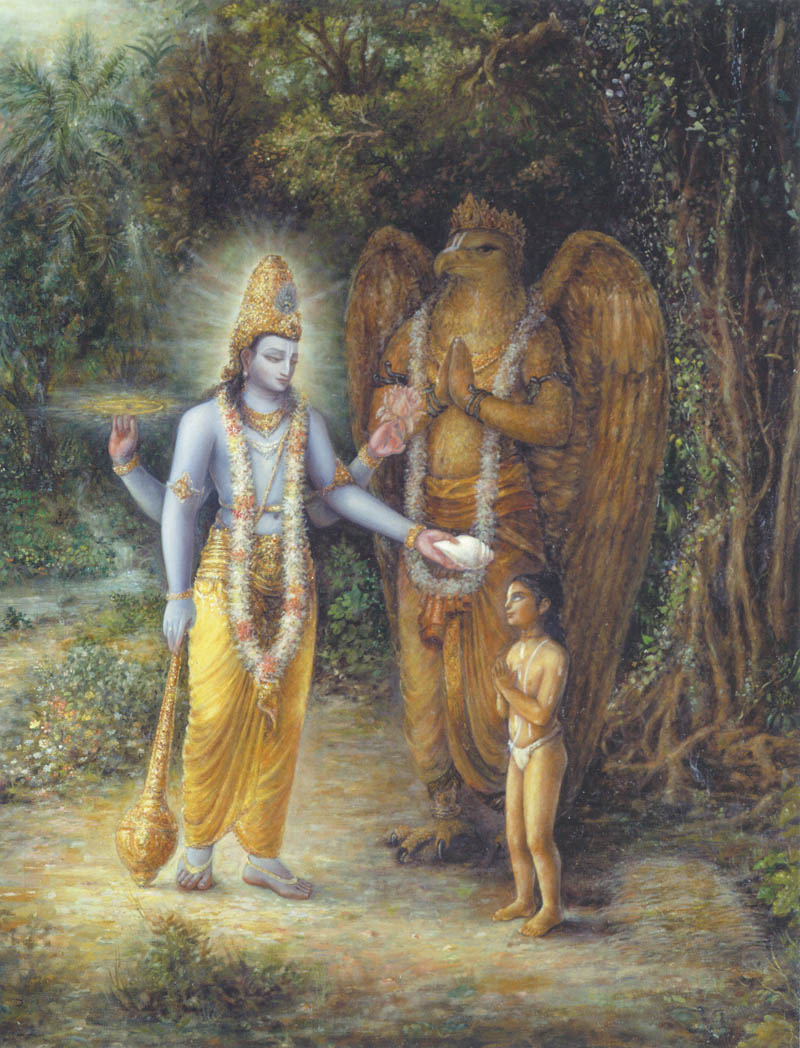 days, and after some time he also left breathing and entered samādhi, a trance. Then, after six months his complete stoppage of breathing choked up the universal breathing. The demigods prayed to the Lord for help, and Kṛṣṇa appeared before him as His expansion, Lord Viṣṇu. Lord Viṣṇu first entered Dhruva’s heart, with cakra (disc), padma (lotus flower), conch, and club, after which He appeared directly in front of Dhruva. Then?
days, and after some time he also left breathing and entered samādhi, a trance. Then, after six months his complete stoppage of breathing choked up the universal breathing. The demigods prayed to the Lord for help, and Kṛṣṇa appeared before him as His expansion, Lord Viṣṇu. Lord Viṣṇu first entered Dhruva’s heart, with cakra (disc), padma (lotus flower), conch, and club, after which He appeared directly in front of Dhruva. Then?
Vrajanātha dāsa: He was so overwhelmed…
Śrīla Bhaktivedānta Nārāyaṇa Mahārāja: No. When He came in front of Dhruva, Dhruva’s samādhi broke, and he wondered, “Where is Bhagavān?” He thus opened his eyes and saw Viṣṇu before him, but he was not able to offer prayers.
Out of His compassion, Viṣṇu touched His conch shell to Dhruva’s forehead, and thus Dhruva was able to pray. Viṣṇu then told him, “You will be the king, not only of your father’s kingdom but of the entire universe. When your time in this body is over, you will not die. Keeping your feet on the head of death, you will go to Dhruvaloka and serve Me there.”
After Viṣṇu disappeared, Dhruva Mahārāja began to lament: “What wrong I have done! I was searching for broken glass, and I received cintāmaṇi, a desire-stone. If one wants gold, that cintāmaṇi will manifest gold. If one wants a kingdom, he will get a kingdom. Why did I want this broken glass? Oh, I am cheated. I am cheated.”
In the meantime, while Dhruva was still away from the palace, Nārada came and told the king, “Your son is returning.” King Uttānapāda then became free from the fear of Suruci and, with his elephants, horses, and entire army, he came out of the city to greet and embrace his son. He brought Dhruva to his palace and gave him his entire kingdom.
If anyone is determined to have darśana of Kṛṣṇa, he must be very fixed. Kṛṣṇa then sends His associate, who teaches that aspiring devotee how to attain His darśana, and that associate gives him a mantra and teaches him  how to practice it.
how to practice it.
Tamopahā dāsa: Dhruvaloka became the Polestar, the star that all other planets circumambulate.
Vṛndā-devī dāsī: Dhruvaloka will never be destroyed?
Śrīla Bhaktivedānta Nārāyaṇa Mahārāja: All the planets, including the Sun and the Moon as well as all the hundreds and thousands of stars, revolve around the Polestar, the planet of Mahārāja Dhruva, in their respective orbits; some higher and some lower. There, in Dhruvaloka, resides an incarnation of Kṛṣṇa named Hari, who is surrounded by great opulence. Dhruva was not sent to Goloka Vṛndāvana. For that, there must be special mercy.
(To Tamopahā dāsa) Will you take your wife and sons?
Tamopahā dāsa: She wants to go to heaven and be with Jesus. I want to go to Goloka.
The following is an excerpt from the book Upadeśāmṛta, The Ambrosial Advice of Śrī Rūpa Gosvāmī (Third edition), by Śrīla Bhaktivedānta Nārāyaṇa Mahārāja
Initiation is prescribed for every living entity in every birth. If it is seen in the life of a perfected, great personality (siddha–mahāpuruṣa) that he does not take initiation, it is not to be taken as a precedent. Those mahāpuruṣas have displayed such behaviour due to special situations, and therefore, it is not to be considered a general rule. Śrī Dhruva Mahārāja went to Dhruvaloka in his material body. Upon hearing about this, should everyone hope and wait to enter Dhurvaloka in their material body? The general rule is that when the living entity gives up his material body, he goes to Vaikuṇṭha in his spiritual body.
The following is an excerpt from Śrīla Bhaktivedānta Nārāyaṇa Mahārāja’s book Śrī Vraja-maṇḍala Parikramā
On the eastern side of the village of Maholī is Dhruva-ṭīlā, where the deities of the child Dhruva and his worshipful four-armed Śrī Nārāyaṇa splendidly reside. Dhruva performed severe austerities here to attract the Supreme Lord, using the mantra Devarṣi Nārada had given him. Being pleased with his worship, the Lord appeared before Dhruva and awarded him absolute monarchy over the entire Earth for 36,000 years, followed by rulership of Dhruvaloka, an imperishable abode of Śrī Hari within this material universe.
An excerpt from a morning walk with Śrīla Bhaktivedānta Nārāyaṇa Mahārāja in Johor Bahru, Malaysia, on January 26, 2009, published in Walking with a Saint – Morning Walks and Conversations 2009
Prakāśātmā dāsa: Yesterday we heard the story of Nārada Muni and Dhruva Mahārāja. Viṣṇu manifested Himself to Dhruva Mahārāja, who was a sakāma-bhakta (one who performs bhakti in order to achieve some material benefit). Regarding Nārada Muni, Viṣṇu only appeared to him for a moment – and then disappeared – because Nārada had some attachment to sattva-guṇa (the material mode of goodness). Nārada had a desire to meditate in the forest, which was a desire in the mode of goodness, and for this reason Viṣṇu didn’t show Himself to Nārada for more than a moment. Yet, he showed Himself to Dhruva Mahārāja, who had a much stronger material desire.
Śrīla Bhaktivedānta Nārāyaṇa Mahārāja: (To Śrīpāda Bhāgavata Mahārāja) What is the answer?
Śrīpāda Bhāgavata Mahārāja: You once explained that for those devotees who want śuddha-bhakti, pure, unalloyed bhakti, Kṛṣṇa personally takes over their karma. He gives them more prārabdha-karma** to get them to the point where they can attain śuddha-bhakti because their intentions are originally for śuddha-bhakti. I think Nārada Muni falls in that category?
Śrīla Bhaktivedānta Nārāyaṇa Mahārāja: No, that is not the answer.
(To Śrīpāda Giri Mahārāja) Can you explain?
Śrīpāda Giri Mahārāja: I don’t know, Gurudeva. I’ll be honest.
Śrīla Bhaktivedānta Nārāyaṇa Mahārāja: Dhruva was a sakāma-bhakta (a devotee who performs his devotional activities with material motives); and from the beginning, Nārada was a niṣkāma-bhakta (a devotee who performs his devotional activities with no material motives). We should know that gold is more valuable than iron and that the value of cintāmaṇi (a wish-fulfilling gem) is many times higher than the value of gold. Similarly, niṣkāma-bhakti is very high. Dhruva Mahārāja performed bhakti only for a worldly kingdom, whereas Nārada did not have such desires.
Nārada had been performing austerities, but precious things cannot be acquired by the practice of general austerities. Therefore, it was in order to greatly increase Nārada’s eagerness that Bhagavān told him, “You will not see me again in this lifetime.” He did this because He wanted to make Nārada more advanced in devotional service. He wanted him to be a rasika-bhakta.
Śrīpāda Mādhava Mahārāja: Once you explained that even when Nārada Ṛṣi’s mother expired, he did not concern himself with performing ritualistic ceremonies for her. Rather he immediately went to the forest to do bhajana. On the other hand, even when Dhruva was seated in the transcendental aeroplane that was just about to take him to Vaikuṇṭha, he remembered his mother, Sunīti. He thought, “How shall I go alone to Vaikuṇṭha, leaving behind my poor mother? I will not go without her.”
Śrīpāda Giri Mahārāja: Sakāma-bhakta Dhruva Mahārāja is a typical example of a karma-miśra-bhakta (a devotee whose bhakti is mixed with the desire for fruitive reward). Who is a typical example of a jñāna-miśra-bhakta (a devotee whose bhakti is mixed with the desire to merge into impersonal brahma)?
Śrīla Bhaktivedānta Nārāyaṇa Mahārāja: The four Kumāras, and also Śukadeva Gosvāmī in his first stage.
Śrīpāda Giri Mahārāja: What about Lord Śiva?
Śrīla Bhaktivedānta Nārāyaṇa Mahārāja: Oh, he is so high – far superior to other devotees. He is the guru of all Vaiṣṇavas. He is even Nārada’s guru.
Śrīpāda Mādhava Mahārāja: “Vaiṣṇavānāṁ yathā śambhuḥ – he is the greatest Vaiṣṇava.”
Śrīla Bhaktivedānta Nārāyaṇa Mahārāja: He is not under any rules and regulations, or anyone’s control.
Śrīpāda Mādhava Mahārāja: In one form, Śivajī is Gopeśvara. He is beyond all these categories.
Śrīpāda Giri Mahārāja: And Lord Brahmā?
Śrīla Bhaktivedānta Nārāyaṇa Mahārāja: Brahmā is a dāsya-bhakta; adhikārika-dāsa.
Śrīpāda Giri Mahārāja: Is he a karma-miśra or jñāna-miśra-bhakta?
Śrīla Bhaktivedānta Nārāyaṇa Mahārāja: Adhikārika-dāsa means that he was given the order and adhikāra (qualification) to create the world. He can create only by the power of Kṛṣṇa, and he does so. Because he creates by the order of Kṛṣṇa, he is called adhikārika-dāsa.
Śrīpāda Giri Mahārāja: Brahmā is always a pure devotee?
Śrīla Bhaktivedānta Nārāyaṇa Mahārāja: He is a śuddha-bhakta, but not a rasika bhakta. He may become a  rasika bhakta in the future.
rasika bhakta in the future.
Moreover, there are so many Brahmās. Our Brahmā requested Kṛṣṇa that he become the foot-dust of the residents of Vṛndāvana; this is not an ordinary prayer.
Śrīpāda Mādhava Mahārāja: Brahmājī became a mountain in Varṣāṇā (Brahma-parvata) by performing worship of Rādhā.
Śrīla Bhaktivedānta Nārāyaṇa Mahārāja: Yes. Śaṅkara manifests in Nandagaon as the mountain Nandīśvara Hill, and Brahmā as Brahma-parvata in Varṣāṇā.
Brahmā is our ādi-guru (the first guru in our Brahma-Madhva Gauḍīya sampradāya), not Śaṅkara. In this way, we follow Brahmā, not Śaṅkara.
Śrīpāda Mādhava Mahārāja: Śaṅkara is followed by Viṣṇusvāmī of the Rudra sampradāya.
* Several devotees had been sending computer files for the Hindi translation of Śrīmad-Bhāgavatam, Tenth Canto.
**Prārabdha-karma is the result of previous activities which have already begun to bear fruit in the form of happiness or distress.
The following is an excerpt from the book Guru-devatātmā, Accepting Śrī Guru as One’s Life and Soul by Śrīla Bhaktivedānta Nārāyaṇa Mahārāja
Without accepting guru, the name one chants is not transcendental. That name will fulfil your worldly desires, even up to mukti (liberation), but not more than this.
Ajāmila had no guru at first. He named his son Nārāyaṇa, one of the Lord’s names, at the nāma-saṁskāra, the ritualistic ceremony in which babies are given their names. By chance, because he lived in the Vedic culture, he named his son Nārāyaṇa, and by his recitation of that name he began chanting nāmābhāsa (the clearing stage of chanting). That was his first chanting of nāmābhāsa, and after that he would daily call out, “O Nārāyaṇa, come on, come on!” By continually doing this, his nāmābhāsa continued.
Later, when Ajāmila was dying, he saw the ferocious forms of the Yamadūtas, the constables of the god of death. Being very fearful, the name of his son automatically came to his throat and he called out, “Nārāyaṇa!” At that time, at the moment of death, the Supreme Lord Nārāyaṇa sent His four messengers, the Viṣṇudūtas, and Ajāmila heard their dialogue as they drove out the Yamadūtas. He heard the holy name and glorification of the name of Nārāyaṇa from the Viṣṇudūtas, and thus he received the seed of śuddha-nāma (the pure name) from them. By this, he received the seed of bhakti, his life returned, and he thought, “The holy name that I heard from the four Viṣṇudūtas is so powerful! And the glory of that name is so wonderful! Now that I have received this mantra, I must give up this wife, that wife, all my children, and all my possessions.” He left everything and went to Haridvāra, where he bathed in the Ganges, sat down on the bank, and began chanting. eventually, he began to chant śuddha-nāma.
After some time, the Viṣṇudūtas again came to Ajāmila, and this time they said, “Come with us and sit in this chariot-aeroplane.” By now Ajāmila had reached the stages of bhāva, and then prema. By continuously chanting, “Oṁ namo nārāyaṇāya,” he attained vaikuṇṭha-rati. His rati (prema) was not vṛndāvana-rati, not mādhurya-mayi prema (loving Godhead with intimacy), but rather it was aiśvarya-mayi prema (love of Godhead in awe and reverence, with knowledge of His opulence).
Ajāmila told the Viṣṇudūtas, “When you drove away the Yamadūtas, I wanted to speak with you and touch your feet, but you disappeared. Now you have appeared again and you are telling me to go with you. How did this come to be?”
The Viṣṇudūtas replied, “We gave you the seed of the pure name and we gave you the seed of bhakti-latā (the  creeper of devotion). By chanting and regularly bathing in the Ganges, you are now purified. You have attained vaikuṇṭha-rati and are qualified to come to Vaikuṇṭha.” Then, they took him there.
creeper of devotion). By chanting and regularly bathing in the Ganges, you are now purified. You have attained vaikuṇṭha-rati and are qualified to come to Vaikuṇṭha.” Then, they took him there.
By the time the Viṣṇudūtas appeared to Ajāmila for the second time, he had become totally free from all material desires. In the case of Dhruva Mahārāja, however, although he was a disciple of Nārada, he still had a slight attachment to his mother. It was for this reason that he could not go to the Vaikuṇṭha planet situated beyond the sum total of all the material universes, called mahat-tattva. Rather, he went to Dhruvaloka, a spiritual planet situated near Ramāpriya Vaikuṇṭha within this universe.
Vālmīki Ṛṣi was also a disciple of Nārada. Prior to meeting Nārada, he had been a dacoit. He had killed millions of brāhmaṇas (the learned, priestly class) and tapasvīs (ascetics), and had stolen their wealth. When Nārada Ṛṣi met him, he preached to him about the glories of Bhagavān, the Supreme Lord, and at last he said, “You should sit here. I am giving you the seed of the pure name. Chant ‘Rāma’.” However, Vālmīki was not qualified to chant the name of Rāma. Understanding this, Nārada told him, “If you cannot chant the name of Rāma, then chant ‘Ma-ra, ma-ra, ma-ra (death, death, death).’ ” Vālmīki replied, “Oh, I can do that,” and he began chanting, “Mara, mara.” Since he was a disciple of Nārada, he was able to get such a concession.
What became of Vālmīki? After many thousands of years, his chanting of mara turned into Rāma, and then he became qualified to write rāma-līlā, the pastimes of the Supreme Personality of Godhead in His form of Rāma. He saw that līlā in his samādhi trance; and thus, as Śrīmad-Bhāgavatam was written by Śrī Vyāsadeva in samādhi-bhāṣya, trance language, in the same way Rāmāyaṇa was written by Śrī Vālmīki. Vālmīki saw everything about rāma-līlā in his trance even before Rāma had actually exhibited His pastimes in this world. In this way, he wrote down those pastimes in his Śrī Vālmīki Rāmāyaṇa.
We should understand that without guru, we are bound to have material attachments and we are bound to commit offences to the holy name (nāmāparādha). If the seed of bhakti and one’s relationship with Kṛṣṇa (sambandha-jñāna) are not given by a pure guru, there can be no śabda-brahma, experience of transcendental sound. Acceptance and surrender to a sad-guru is essential.
Although Kṛṣṇa is the Supreme Personality of Godhead, He also accepted a guru. The gopīs once teased Him 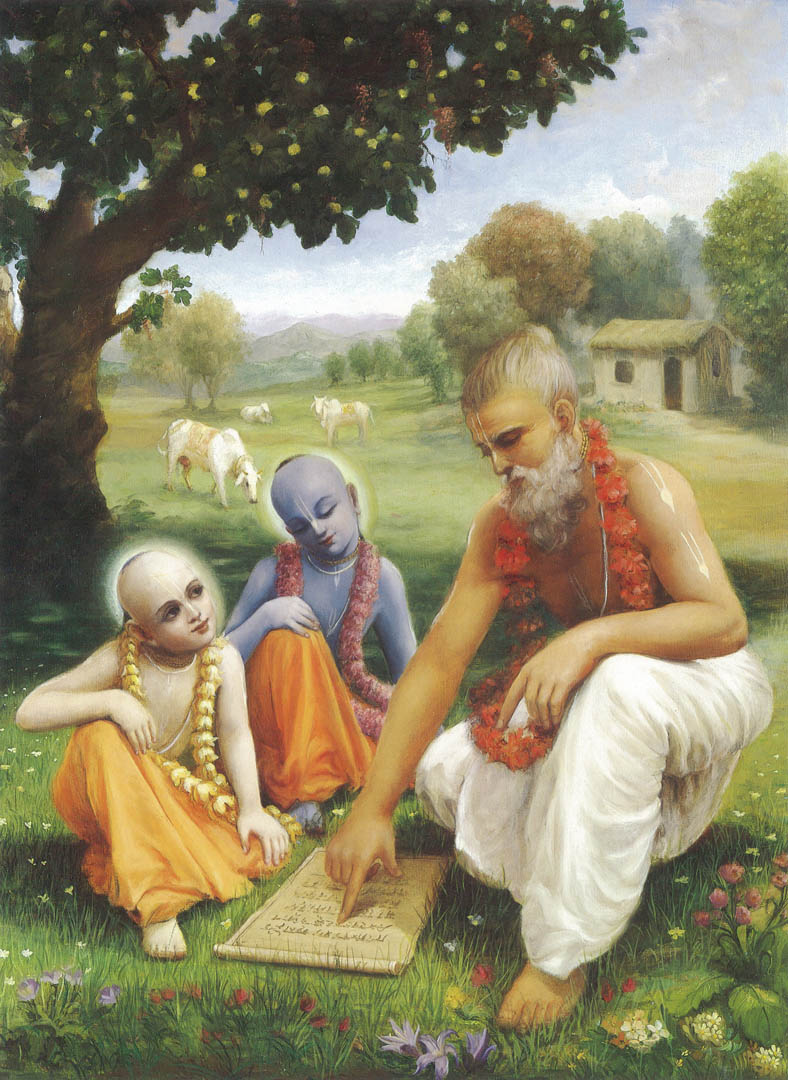 by saying, “You have no guru?” Kṛṣṇa replied, “Who has said this? My gurudeva is Bhāguri Ṛṣi.”
by saying, “You have no guru?” Kṛṣṇa replied, “Who has said this? My gurudeva is Bhāguri Ṛṣi.”
It is generally accepted that Kṛṣṇa’s guru was Sāndīpani Muni, but actually Sāndīpani Muni was like a teacher. He taught Kṛṣṇa the sixty-four arts, and therefore he was like a schoolteacher.
Kṛṣṇa received rādhā-mantra from Bhāguri Ṛṣi, and therefore it is Bhāguri Ṛṣi who is actually His guru.
In this world, when Kṛṣṇa or any of His incarnations descend, they accept a guru. Śrī Caitanya Mahāprabhu, who is Kṛṣṇa Himself, also accepted a guru. He accepted harināma and gopāla-mantra from Īśvara Purīpāda, and He Himself said to Prakāśānanda Sarasvatī when asked by him why He engaged in harināma-saṅkīrtana instead of studying Vedānta:
prabhu kahe — śuna, śrīpāda, ihāra kāraṇa
guru more mūrkha dekhi’ karila śāsana
Śrī Caitanya-caritāmṛta (Ādi-līlā 7.71)
[Śrī Caitanya Mahāprabhu replied to Prakāśānanda Sarasvatī, “My dear sir, kindly hear the reason. My spiritual master considered Me a fool, and therefore he chastised Me.”]
mūrkha tumi, tomāra nāhika vedāntādhikāra
‘kṛṣṇa-mantra’ japa sadā, — ei mantra-sāra
Śrī Caitanya-caritāmṛta (Ādi-līlā 7.72)
Caitanya Mahāprabhu quoted his spiritual master as saying, “You have no qualification to enter Vedānta philosophy. You are foolish and ignorant, and You should therefore simply chant harināma.”
harer nāma harer nāma
harer nāmaiva kevalam
kalau nāsty eva nāsty eva
nāsty eva gatir anyathā
Bṛhan-nāradīya Purāṇa (38.126)
[To attain one’s spiritual goal in Kali-yuga, there is no other way, there is no other way, there is no other way than to chant the holy name, chant the holy name, chant the holy name.]
His gurudeva gave Him this mantra:
hare kṛṣṇa hare kṛṣṇa, kṛṣṇa kṛṣṇa hare hare
hare rāma hare rāma, rāma rāma hare hare
Why did Śrī Kṛṣṇa Caitanya Mahāprabhu not utter the name of His sannyāsa-guru, Keśava Bhāratī? After all, acceptance of sannyāsa, the renounced order of life, is not a small thing. It is not less than harināma or dīkṣā initiation. The reason is that Caitanya Mahāprabhu had first spoken the sannyāsa-mantra into the ear of Keśava Bhāratī, and after that Śrī Keśava Bhāratī spoke it into Mahāprabhu’s ear.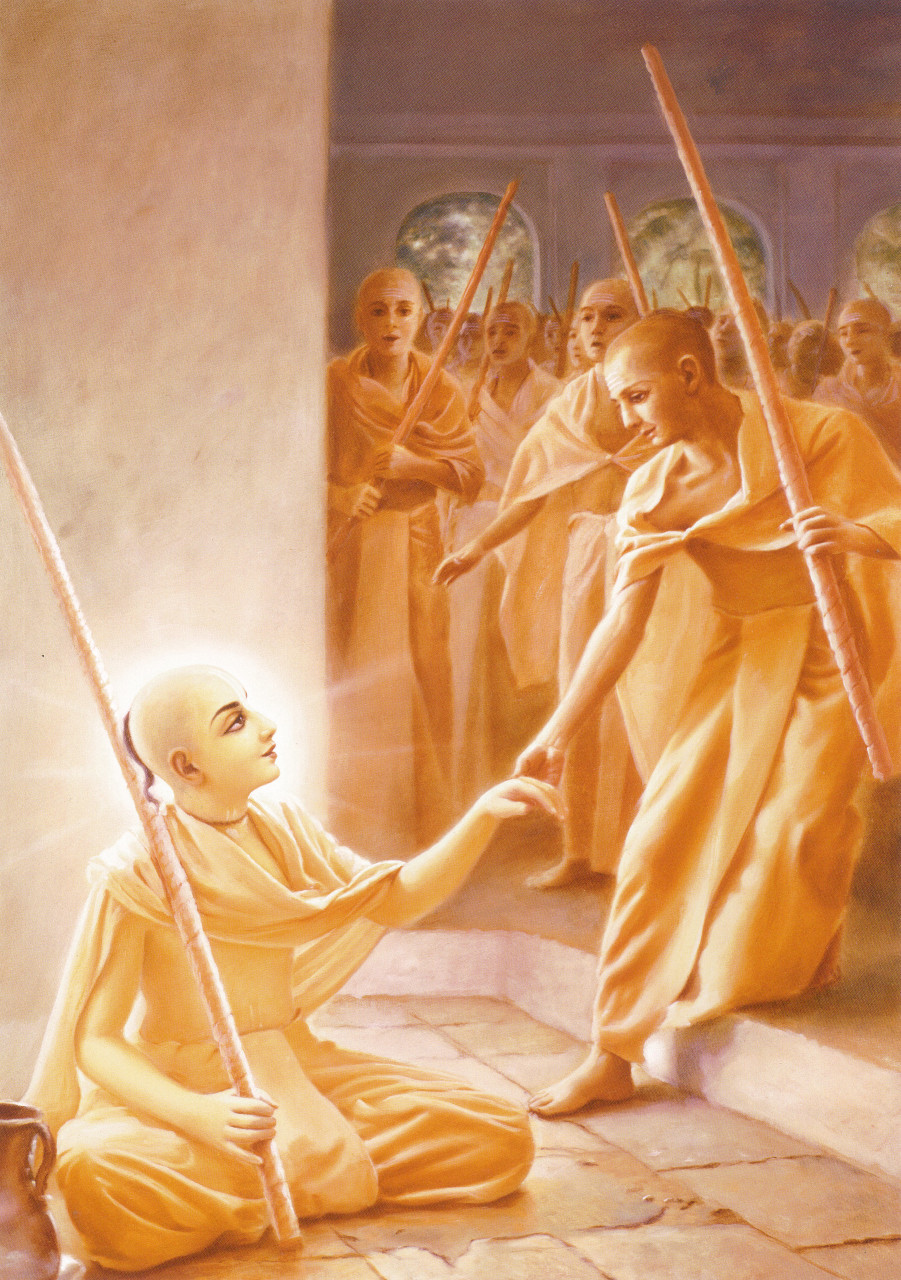
Therefore, Śrī Caitanya Mahāprabhu only told Prakāśānanda Sarasvatī the name of Śrī Īśvara Purī, and He said that the mantra given by Śrī Īśvara Purī had made Him like a madman. In His human-like pastimes, if these mantras had not been given by Śrī Īśvara Purīpāda, Mahāprabhu would not have developed His relationship with Kṛṣṇa and He would not have tasted such prema. Try to know all these truths.
The following is an excerpt from a discourse on Namābhāsa delivered by Śrīla Bhaktivedānta Nārāyaṇa Mahārāja in Cessnock, Australia, on February 25, 2002
We see that the Viṣṇudūtas also came to Dhruva at the time of his death, but he said to them, “Where is my mother?” He had some attachment, and that is why he was stopped from going to Vaikuṇṭha, and instead went to Dhruvaloka, which is the Viṣṇuloka here in this universe. He was not fully liberated like Ajāmila. Ajāmila went to Vaikuṇṭha and Dhruva was stopped in this universe and went to Hariloka. Don’t doubt this.
Chapter 9 from the book, Going Beyond Vaikuṇṭha, 4th edition by Śrīla Bhaktivedānta Nārāyaṇa Mahārāja
Vaikuṇṭha is the pinnacle attained by vaidhī-bhakti and is not minimised in our scriptures. Up to the Ninth Canto of Śrīmad-Bhāgavatam it is said to be the highest destination. Where was Ajāmila taken? What was the destination of Prahlāda? Vaikuṇṭha. And what was the destination of Dhruva? Dhruvaloka, meaning one extended part of Vaikuṇṭha. Therefore it has been stated that there is no higher place to be attained by performing bhakti. Although in one or two places in the scriptures we find the glories of Goloka Vraja described, they have been described so briefly that an ordinary person will not understand Goloka’s true value; only one who can extract the essence will see, not everyone. Obtaining residence there is extremely rare, and within Gopa-kumāra’s heart is that rare desire for darśana of Gopāla. Along with that he desires kṛṣṇa-prema that is unrestricted like a horse with no reins.
The following is an excerpt from a discourse on Alloyed And Unalloyed Devotion delivered by Śrīla Bhaktivedānta Nārāyaṇa Mahārāja in Badger, California, on May 19, 2003
What is it about Dhruva Mahārāja’s bhakti that we don’t want to follow?
āśraya laiyā bhaje, tāre kṛṣṇa nāhi tyaje,
āra saba more akāraṇa
[The Vaiṣṇavas continually take shelter of Śrī Kṛṣṇa and worship Him, and never abandon Him. They are liberated souls, free from the cycle of birth and death. (Narottama dāsa Ṭhākura, Prārthanā 44.1)]
What is the meaning? “Āśraya” refers to Gurudeva, Śrīmatī Rādhikā and the devotees. Those who have taken shelter of any bona fide Guru will not give up Lord Kṛṣṇa. Somehow or other they will hold on to Him. Dhruva Mahārāja took His shelter but from very far away. Dhruvaloka, the planet he was given to rule, is always in the north, and this planet does not belong to this material world. It is partially transcendental. It is an abhāsa, or shadow, of transcendence. What service does Dhruva Mahārāja have in Dhruvaloka? None. The moon, sun and other planets are orbiting him, but that is all.
Dhruva Mahārāja has no service, whereas bhakti means “ ānukūlyena kṛṣṇānu-śīlanaṁ“, to serve Kṛṣṇa in a favourable mood, continuously, and under guidance. Therefore high-class Vaiṣṇavas in the line of Śrīla Rupa Gosvāmī do not accept Dhruva Mahārāja’s bhakti.
In Śrīla Sanātana Gosvāmī’s Śrī Bṛhad-bhāgavatāmṛta, Dhruva’s stage of bhakti has not even been mentioned. Śrīla Sanātana Gosvāmī explains uttama-bhakti beginning with the jñānī-bhakta, the pure devotee who has realized the Lord’s Godhood, and then progresses to the śuddha–bhakta, premī-bhakta, premapara-bhakta, and premātura-bhakta. After this stage there are no more bhaktas; everyone serves Śrī Kṛṣṇa as His associate.
The following is an excerpt from a discourse on the various stages of devotion and devotees delivered by Śrīla Bhaktivedānta Nārāyaṇa Mahārāja in Murwillumbah, Australia, on December 4, 2002
Dhruva Mahārāja was a sakāma-bhakta, a devotee whose motive for service is the fulfilment of his material desires. Dhruva performed austerities for the sole purpose of attaining a kingdom. Therefore, when Lord Nārāyaṇa appeared to him, there was no need to ask for the fulfilment of his desire. Without waiting for Dhruva to ask for his desired boon, Lord Nārāyaṇa told him, “I am now giving you the kingdom of the whole universe to rule for 36,000 years.” After speaking thus He disappeared, and Dhruva began to weep. He cried out, “What a mistake I have made! I was searching for a broken piece of glass and I was fortunate to attain a cintāmaṇi stone instead, but now I have lost it.”
What is the essence of this history? Although Dhruva Mahārāja was initiated by a bona fide guru like Śrī Nārada Ṛṣi, at the time of his initiation he had so many desires to rule the world. Then, after initiation, he performed very severe austerities, up to the point of not even breathing air. By the will of Lord Nārāyaṇa he automatically received the position he wanted, for his father came to him and told him, “Everything is yours.” Dhruva Mahārāja then sat on the throne and began to rule the world. During his reign, his guru Nārada and other highly elevated Vaiṣṇavas used to visit his palace, and he served them continually. He served Hari, guru, and Vaiṣṇavas, sometimes when they were visiting him and otherwise in their absence. The visiting Vaiṣṇavas would instruct him in bhakti, and gradually he became elevated. His desire to have a throne totally disappeared.
A karmi has worldly desires, but if he simply worships the Supreme Lord Kṛṣṇa or His manifestations like Rāma, Narasiṁha, Kalki, and Nārāyaṇa, all his desires will eventually disappear and pure bhakti will manifest in his heart. Similarly, by the association of Śrī Nārada Ṛṣi and other ṛṣis, Dhruva Mahārāja’s desires disappeared and  pure bhakti appeared.
pure bhakti appeared.
Still, something remained – a slight contamination (kaṣāya), and this was likened to Nārada Ṛṣi in his previous life. Because of this kaṣāya, Dhruva Mahārāja wanted to see his mother as he was boarding the Vaikuṇṭha aeroplane, and that is why he could not attain Vaikuṇṭha. That is why he entered Dhruvaloka, [a spiritual planet] located near Ramāpriya Vaikuṇṭha planet within this universe. He could not attain any direct service to Nārāyaṇa there, but because he was a disciple of Nārada Muni, it may be that after some time he achieved the Vaikuṇṭha planets beyond the universe.
Narottama dāsa Ṭhākura sings in his “Ṭhākura Vaiṣṇava-pada”:
ṭhākura vaiṣṇava-pada, avanīra su-sampada,
śunô bhāi, hôiyā eka-mana
āśraya lôiyā bhaje, tā’re kṛṣṇa nāhi tyaje,
āra saba mare akāraṇa (1)
[“The lotus feet of the saintly Vaiṣṇavas are the greatest wealth in this world. O my dear brothers! Please listen attentively. Kṛṣṇa never forsakes one who takes shelter of the Vaiṣṇavas and worships Him. Others live and die without reason.”]
The pure guru, the high-class śikṣā or dīkṣā-guru, is āśraya-bhagavān. Those conditioned souls who try to take shelter of Kṛṣṇa directly may be rejected by Him, but regarding those conditioned souls who take firm shelter of a bona fide śikṣā-guru, dīkṣā-guru, or any Vaiṣṇava, Kṛṣṇa will think, “He wants poison, but how I can give it to him? I must give him the nectar of bhakti.” Under this circumstance, Kṛṣṇa gives bhakti in the end. In the middle the person has to taste the results of his desire, but after this he can become eligible to attain pure bhakti. This is the essence of the history of Dhruva Mahārāja.
The following is an excerpt from Śrīla Bhaktivedānta Nārāyaṇa Mahārāja’s letter to Dāmodara dāsa (The Netherlands), September 18 1997
I received your letter dated 30-08-1997 and I was so happy to read it. You have quoted so many places in the scriptures about liberation and those who attain Maheśa-dhāma. Then your question is about those who attain Prāpañcika Vaikuṇṭhaloka, which is situated within this universe. The devotee who does bhajana with material desires and is very determined to have the Lord’s darśana, will attain Prāpañcika Vaikuṇṭha, after having the Lord’s darśana. An example is Dhruva Mahārāja. The Lord will fulfil the material desires of His devotee and after this he will go to Prāpañcika Vaikuṇṭha. Because having had the darśana of the Lord, makes the devotee free from any material desire and he becomes niṣkāma, but initially he worshipped the Lord to attain the result of his material desires.
The following is an excerpt from the book Śrī Caitanya-caritāmṛta by Kṛṣṇadāsa Kavirāja Gosvāmī (Translation into English and purport by Śrīla Bhaktivedānta Svāmī Mahārāja Prabhupāda)
mātā bale, — tāi diba, yā tumi māgibe
prabhu kahe, — ekādaśīte anna nā khāibe
Śrī Caitanya-caritāmṛta, Ādi-līlā 15.9
His mother replied, “My dear son, I will give You whatever You ask.” Then the Lord said, “My dear mother, please do not eat grains on the Ekādaśī day.”
From the very beginning of His childhood life Śrī Caitanya Mahāprabhu introduced the system of observing a fast on the Ekādaśī day. In the Bhakti-sandarbha, by Śrīla Jīva Gosvāmī, there is a quotation from the Skanda Purāṇa admonishing that a person who eats grains on Ekādaśī becomes a murderer of his mother, father, brother and spiritual master, and even if he is elevated to a Vaikuṇṭha planet, he falls down. On Ekādaśī, everything is cooked for Viṣṇu, including regular grains and dhal, but it is enjoined that a Vaiṣṇava should not even take viṣṇu-prasādam on Ekādaśī. It is said that a Vaiṣṇava does not accept anything eatable that is not offered to Lord Viṣṇu, but on Ekādaśī a Vaiṣṇava should not touch even mahā-prasādam offered to Viṣṇu, although such prasādam may be kept for being eaten the next day. It is strictly forbidden for one to accept any kind of grain on Ekādaśī, even if it is offered to Lord Viṣṇu.
The following is an excerpt from the book The Beauty of a Premī-Bhakta by Śrīla Gaura Govinda Svāmī Mahārāja, published by Tattva Vicara Publications (Tvpbooks.com)
Devotee: So can one fall from Vaikuṇṭha?
ŚrīlaGaura Govinda Svāmī Mahārāja: You see, no one falls from Vaikuṇṭha, but there is a Prāpañcika Vaikuṇṭha, and that is where one may fall from. That is mentioned in the Eighth Canto of the Bhāgavatam and Jīva Gosvāmī has also discussed that in the Sandarbhas. From this Prāpañcika Vaikuṇṭha, one may fall, and therefore it is sometimes said that one falls from Vaikuṇṭha. Yes. From there one falls.
Devotee: Is that where people go who still have anarthas, they go to that Vaikuṇṭha?
Śrīla Gaura Govinda Svāmī Mahārāja: Yes, most people go to that Vaikuṇṭha.
The following excerpt is from a discourse on Śrī Caitanya-caritāmṛta, Madya-līlā Chapter 19, Śrī Rūpa-śikṣā was delivered by Śrīla Bhaktivedānta Nārāyaṇa Mahārāja in Toulouse, France, on July 7, 2002
If you cannot be in Vṛndāvana physically, then try to meditate on Vṛndāvana. If you always chant and remember under the guidance of a rasika-tattvajña Vaiṣṇava, your bhakti will increase.
upajiyā bāḍe latā ‘brahmāṇḍa’ bhedi’ yāya
‘virajā’, ‘brahma-loka’ bhedi’ ‘para-vyoma’ pāya
(Śrī Caitanya-caritāmṛta, Madhya-līlā 19.153)
“As one waters the bhakti-latā-bīja, the seed sprouts, and the creeper gradually grows to the point where it penetrates the walls of this universe and goes beyond the Virajā River which is lying between the spiritual world and the material world. It attains brahma-loka, the Brahman effulgence, and penetrating through that stratum it reaches the spiritual sky and the spiritual planet Goloka Vṛndāvana.”
The Virajā River is not influenced by jñāna, karma, yoga, tapasya, etc. In a sense, neither rajas nor tamas (the material modes of passion and ignorance) is present in the Virajā River; only śuddha–sattva, (pure goodness), is there. In another sense, sattva, rajas and tamas are there, but they are mūrcchita (sleeping or lying dormant). They can wake up at any time, however. This means that the jīva may again fall victim to the material energy even if he is situated in the Virajā River, because there is no positive spiritual activity there. The bhakti creeper crosses beyond the Virajā River and bypasses Brahmaloka. * [See Endnote 2] What is Brahmaloka? In this śloka (upajiyā bāḍe latā…) Brahmaloka does not refer to the residence of Lord Brahmā. It refers to the impersonal brahmajyoti. By brahma-jñāna, one may enter and merge in brahma, and at that time he thinks, “I am brahma.” But bhakti-devī can easily cross over this Brahmaloka, and in fact she does not even see it.
The bhakti creeper then goes to paravyoma [the spiritual sky], which is beyond even Śivaloka. Paravyoma, 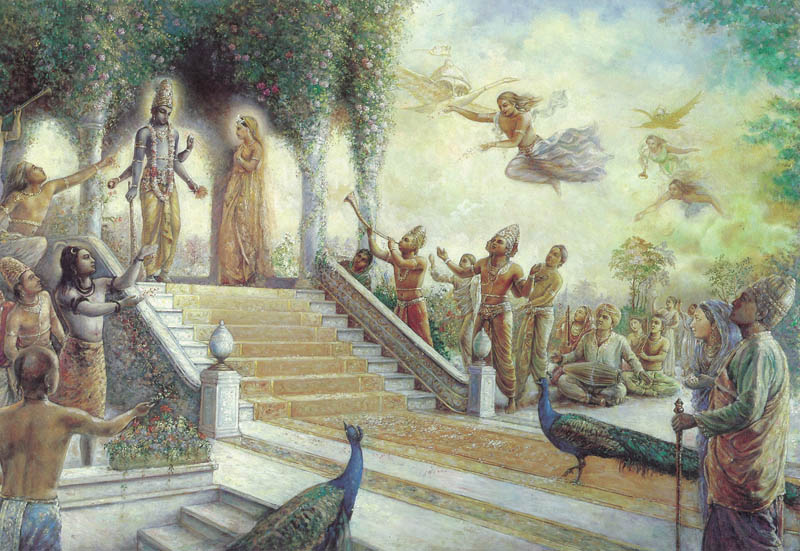 where there is no mixing in brahma, is divided into two sections. The lower of the two is like Vaikuṇṭha, but is not actually Vaikuṇṭha, and the jīva can also go there. It is the Vaikuṇṭha planet within the material world, and it is called Ramāpriya Vaikuṇṭha. In that realm there is sevā-sukha-aiśvarya-uttarā. There, the devotee wants to serve Lord Nārāyaṇa, but he also wants the happiness accrued from the attainment of the four spiritual opulences. That desire for happiness is not like ours, for the devotees there do not have material bodies; still, that desire is not pure. In the higher section there is prema-sevā–uttarā; the devotee only wants to serve Nārāyaṇa with love.
where there is no mixing in brahma, is divided into two sections. The lower of the two is like Vaikuṇṭha, but is not actually Vaikuṇṭha, and the jīva can also go there. It is the Vaikuṇṭha planet within the material world, and it is called Ramāpriya Vaikuṇṭha. In that realm there is sevā-sukha-aiśvarya-uttarā. There, the devotee wants to serve Lord Nārāyaṇa, but he also wants the happiness accrued from the attainment of the four spiritual opulences. That desire for happiness is not like ours, for the devotees there do not have material bodies; still, that desire is not pure. In the higher section there is prema-sevā–uttarā; the devotee only wants to serve Nārāyaṇa with love.
There is great aiśvarya (opulence) in the Vaikuṇṭha planets: one can have the same bodily features as Nārāyaṇa (sārūpya), he can live on the same planet with Him (sālokya), he can have equal opulence (sārṣṭi), and he can have association with the Lord (sāmīpya). But a Vaiṣṇava never wants these four types of liberation; he solely wants to serve.
Nārāyaṇaloka, Nṛsiṁhaloka, Rāmaloka (Ayodhyā), and many other such lokas are within the paravyoma, and the bhakti creeper passes beyond all of them. It crosses beyond nārāyaṇa-bhakti, nṛsiṁha-bhakti, and rāmacandra-bhakti. The devotee will say, “I don’t want that,” and that creeper then goes to Goloka.
The following is an excerpt from Śrīmad-Bhāgavatam, Canto 4: The Creation of the Fourth Order by Śrīla Bhaktivedānta Svāmī Mahārāja Prabhupāda, Chapter Nine, Verses 20-25, Purport
Although the polestar existed before its occupation by Dhruva Mahārāja, it had no predominating deity. Dhruvaloka, our polestar, is the center for all other stars and solar systems, for all of them circle around Dhruvaloka just as a bull crushes grains by walking around and around a central pole. Dhruva wanted the best of all planets, and although it was a childish prayer, the Lord satisfied his demand. A small child may demand something from his father which his father has never given to anyone else, yet out of affection the father offers it to the child; similarly, this unique planet, Dhruvaloka, was offered to Mahārāja Dhruva. The specific significance of this planet is that until the entire universe is annihilated this planet will remain, even during the devastation which takes place during the night of Lord Brahmā. There are two kinds of dissolutions: one during the night of 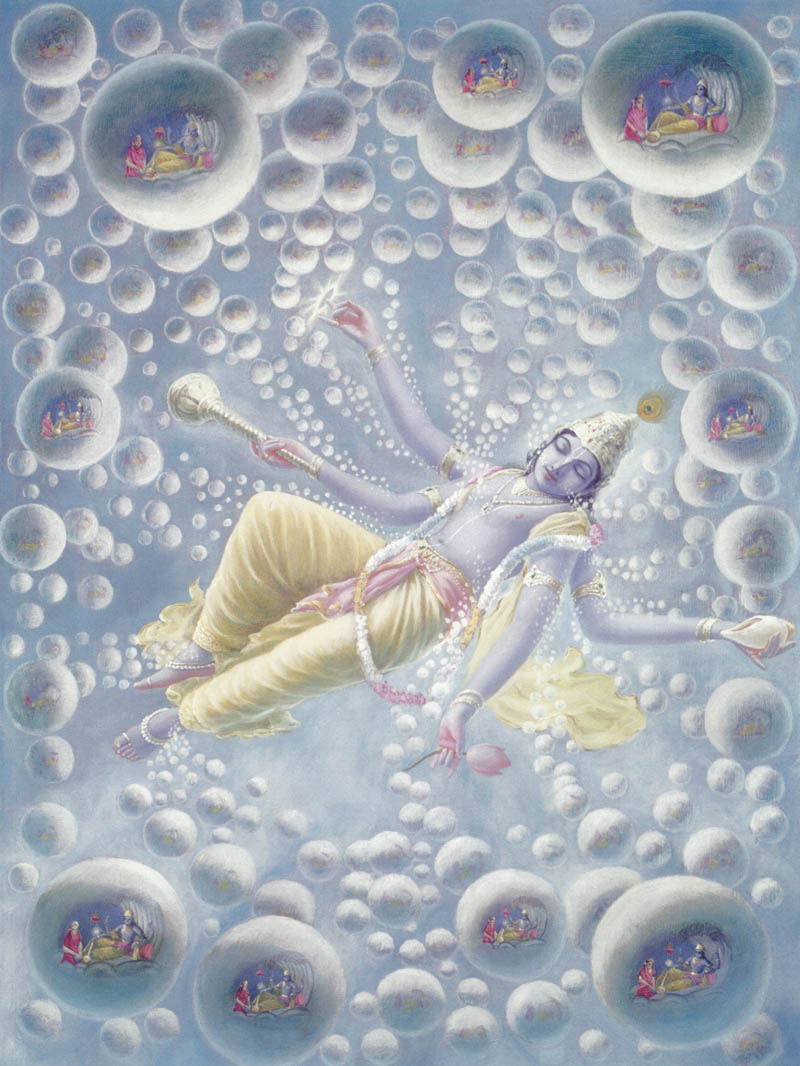 Lord Brahmā and one at the end of Lord Brahmā’s life. At the end of Brahmā’s life, selected personalities go back home, back to Godhead. Dhruva Mahārāja is one of them. The Lord assured Dhruva that he would exist beyond the partial dissolution of this universe. Thus at the end of the complete dissolution, Dhruva Mahārāja would go directly to Vaikuṇṭhaloka, to a spiritual planet in the spiritual sky. Śrīla Viśvanātha Cakravartī Ṭhākura comments in this connection that Dhruvaloka is one of the lokas like Śvetadvīpa, Mathurā and Dvārakā. They are all eternal places in the kingdom of Godhead, which is described in the Bhagavad-gītā (tad dhāma paramam) and in the Vedas (oṁ tad viṣṇoḥ paramaṁ padaṁ sadā paśyanti sūrayaḥ). The words parastāt kalpa-vāsinām, “transcendental to the planets inhabited after the dissolution,” refer to the Vaikuṇṭha planets. In other words, Dhruva Mahārāja’s promotion to the Vaikuṇṭhalokas was guaranteed by the Supreme Personality of Godhead.
Lord Brahmā and one at the end of Lord Brahmā’s life. At the end of Brahmā’s life, selected personalities go back home, back to Godhead. Dhruva Mahārāja is one of them. The Lord assured Dhruva that he would exist beyond the partial dissolution of this universe. Thus at the end of the complete dissolution, Dhruva Mahārāja would go directly to Vaikuṇṭhaloka, to a spiritual planet in the spiritual sky. Śrīla Viśvanātha Cakravartī Ṭhākura comments in this connection that Dhruvaloka is one of the lokas like Śvetadvīpa, Mathurā and Dvārakā. They are all eternal places in the kingdom of Godhead, which is described in the Bhagavad-gītā (tad dhāma paramam) and in the Vedas (oṁ tad viṣṇoḥ paramaṁ padaṁ sadā paśyanti sūrayaḥ). The words parastāt kalpa-vāsinām, “transcendental to the planets inhabited after the dissolution,” refer to the Vaikuṇṭha planets. In other words, Dhruva Mahārāja’s promotion to the Vaikuṇṭhalokas was guaranteed by the Supreme Personality of Godhead.
[…] In this verse the word nāvartate is very significant. The Lord says, “You will not come back to this material world, for you will reach mat-sthānam, My abode.” Therefore Dhruvaloka, or the polestar, is the abode of Lord Viṣṇu within this material world. Upon it there is an ocean of milk, and within that ocean there is an island known as Śvetadvīpa. It is clearly indicated that this planet is situated above the seven planetary systems of the ṛṣis, and because this planet is Viṣṇuloka, it is worshiped by all other planetary systems. It may be questioned here what will happen to the planet known as Dhruvaloka at the time of the dissolution of this universe. The answer is simple: Dhruvaloka remains, like other Vaikuṇṭhalokas beyond this universe. Śrīla Viśvanātha Cakravartī Ṭhākura has commented in this connection that the very word nāvartate indicates that this planet is eternal.
Note from the editor: A purchased animal does not think about his own protection or maintenance, and Mahārāja Ambarīṣa maintained this mood in relation to Bhagavān. Therefore, the Lord personally protected His devotee by sending His ultimate weapon, the Sudarśana cakra. Sudarśana immediately burned Kṛtyā to death, and then he ran towards Durvāsā.
Durvāsā was a powerful yogī, and yet he now ran in fear for his life. Following very closely behind, Sudarśana was almost touching him, ready to burn him as he ran across oceans, into caves, and onto the tops of mountains.
Durvāsā then went to Brahmaloka and prayed to Brahmā for protection. Brahmā replied, “How can I save you? Simply by His glance, Lord Viṣṇu performs the acts of creation and destruction of all the universes. if He is now sending His cakra, how can I save you? You should go now, otherwise that Sudarśana cakra will also come to me.”
Durvāsā then ran to the planet of Śaṅkara, Lord Śiva, but Lord Śiva told him, from a distance, to leave.
Durvāsā Muni then ran to Ramāpriya Vaikuṇṭha and begged Lord Viṣṇu, “Please save me from Your cakra. You are brahmaṇya-deva, the Lord and protector of the brāhmaṇas, so please protect me.”
Bhagavān then told Durvāsā Muni, “I’ll let you know how you can be saved. Listen to Me. Go and take shelter of 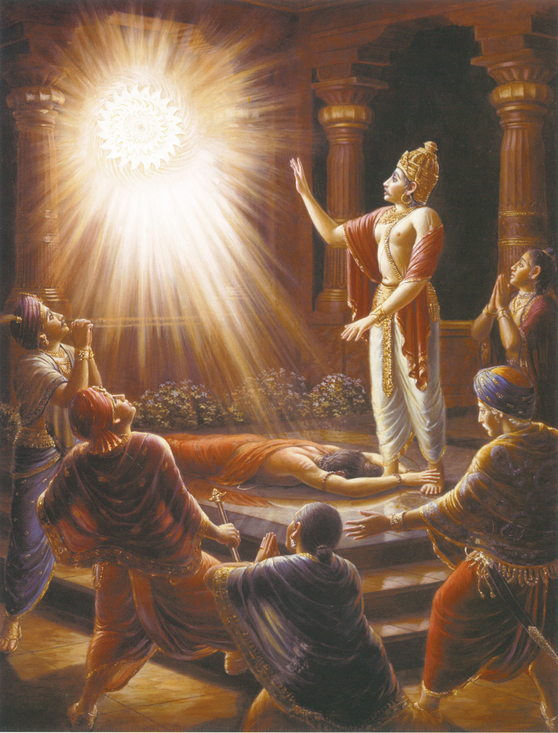 Mahārāja Ambarīṣa.”
Mahārāja Ambarīṣa.”
Durvāsā replied, “How can I go to him? He’ll be angry.”
Bhagavān said, “No, he’ll not be angry. He is samadarṣī – he sees everyone, enemies and friends, with equal vision. Just go and see. One of the symptoms of high-class Vaiṣṇavas is that they’ll forget whatever harm another person does to them, but they’ll never forget whatever good one does to them.
Don’t see Mahārāja Ambarīṣa as the creator of your suffering. You are the cause of your own suffering. You brought him suffering, but still he prayed to the Sudarśana cakra to spare you. It was only because of his prayers that the cakra did not destroy you.”
The devotee considers that suffering is coming to him from a past life, so he never takes revenge, nor does he blame anyone else.
Bhagavān continued, “You are not qualified. Your so-called knowledge is actually ignorance. You think that you are very intelligent and learned, but you should know that austerity and knowledge never stay with proud persons. For a brāhmaṇa, austerity and learning are certainly auspicious, but when acquired by a person who is not gentle, such austerity and learning are most dangerous.”
A person who is proud, puffed up with false ego, and devoid of faith in a self-realized guru cannot possess the results of austerity and knowledge. Even if one is able to give good lectures due to his learning and scholarship, if he is not surrendered, his austerity and knowledge will become like death for him, as was the case with Durvāsā Muni. One must be humble, practising the principles of Śrī Śikṣāṣṭakam:
tṛṇād api sunīcena
taror iva sahiṣṇunā
amāninā māna-dena
kīrtanīyaḥ sadā hariḥ
Finally convinced and, feeling the burning heat of the Sudarśana cakra, Durvāsā Rsi left Vaikuṇṭha to fall at the lotus feet of Mahārāja Ambarīṣa. At that time Mahārāja Ambarīṣa felt ashamed, thinking, “A brahmarṣilike Durvāsā is suffering on my behalf.” — Excerpt from a Hindi lecture delivered by Śrīla Bhaktivedānta Nārāyaṇa Mahārāja in Mathurā, India, on August 22, 2001, published in Harmony
Source: Purebhakti.com
Image/Art made possible by Pixabay.com, Krishnapath.org and/or Bhaktiart.net
Unless indicated differently, all verse translations and quotes are from the books by Śrīla Bhaktivedānta Svāmī Mahārāja Prabhupāda (Vedabase.com)
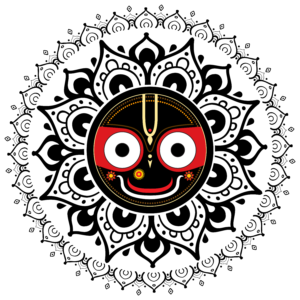
[ad_2]





